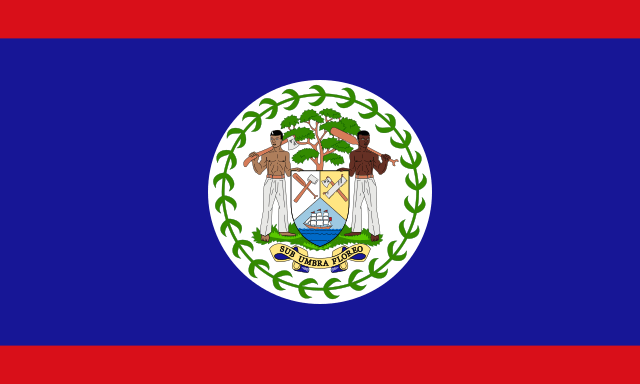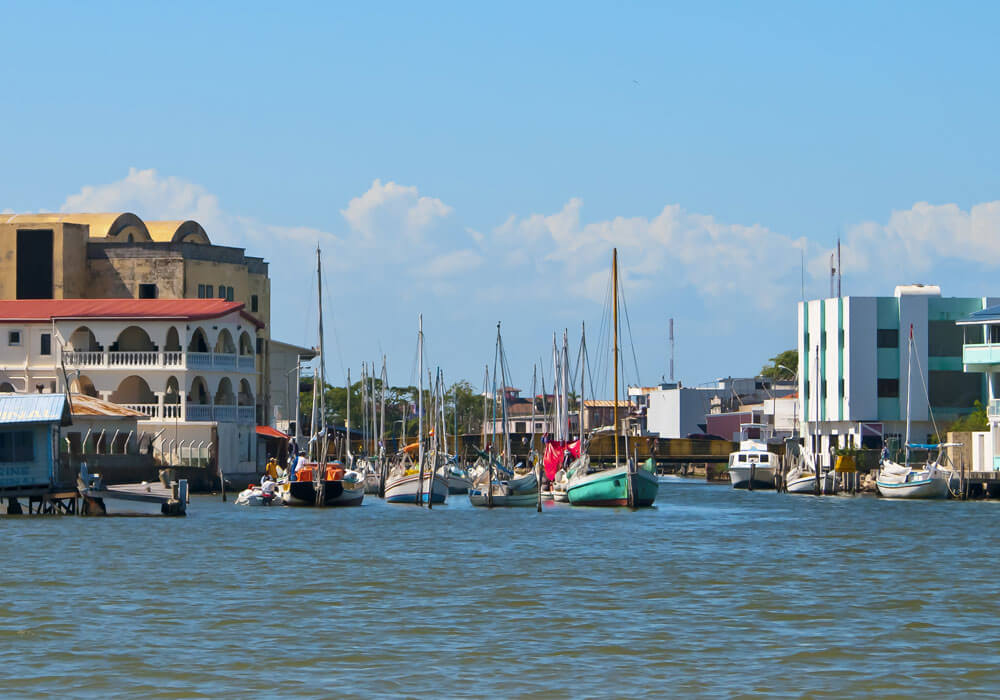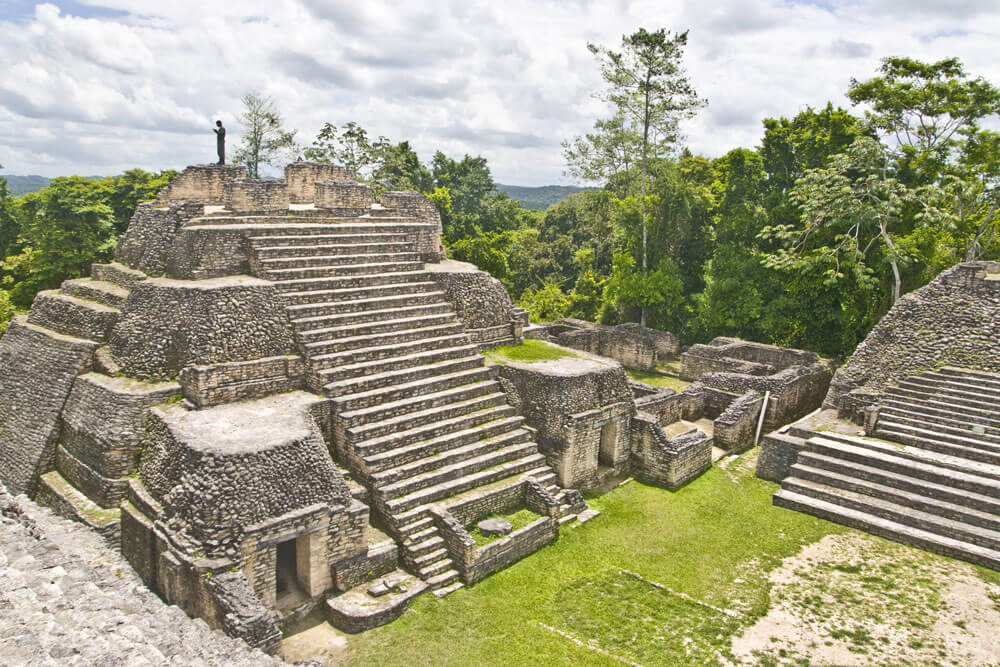Belize

Capital city: Belmopan
Population: 404,914 (2021)
Land area: 22,966 km²
Official language: English
Legal system: English common law
Time zone: GMT-6
Currency: Belize dollar
GDP: 1.7 billion USD (2021)
Main industries: Garment production, food processing, tourism, construction, oil
Principal exports: Seafood, sugar, citrus products, bananas, and clothing
Belize is a Central American country located on the northeast coast of the region, south of the Yucatan Peninsula with Mexico to its north, Guatemala to its southwest and the Caribbean Sea to its east. Originally, the country’s capital was dubbed Belize City; however, following a devastating hurricane in 1961, a new capital was built inland called Belmopan, which is located 80 km west of the original capital. With a land area of 22,966 kmsq, the country is known to be a Caribbean paradise with vibrant blue beaches, jungles and historical sites of the ancient Maya civilisation making it both a cultural and tourist destination. To the south lie the rugged Maya Mountains that branch off into their spur dubbed the Cockscomb Range as well as hills and valleys that surround a plateau of ingenious rock. To the north are lowlands of limestone and swamps no more than 60 metres above sea level.

Demographics
In July 2021, Belize’s population was estimated to be 405,633 pegging the population density at a rather low rate of 17 per kmsq. Due to migration that began in the 1970s, 16% of the Belizean population lives abroad and simultaneously 15% of the Belizean population dwelling within the country consists of migrants. Due to this, the predominant ethnicity in the country has changed from Creole (a mix of African and British descent) to Mestizos (a mix of Mayan and Spanish). The population of current day Belize is 53% Mestizo, 26% Creole, 11% Mayan, 6% Garifuna, 3.6% East Indian and other groups such as Asian and Mennonite comprising the remaining. Of this population, 40% are Roman Catholic, 32% are Protestant making Christianity the dominant religion of the region. The remaining 28% of the population practices Buddhism, Hinduism, Islam, and Rastafarianism amongst others. The official language of Belize is English, spoken by the majority (63%) of the population. The lingua francas of the country are Spanish (57%) and Creole (45%); 10.5% of Belizeans also speak Mayan, 3.2% speak German, and 3% speak Garifuna.
Belize boasts a youthful population; 52% of all citizens are below the age of 25 with the median age being 23.9 years. As of 2021, an estimated 46.2% live in urban areas with almost 30% living in the former capital of Belize City.
History
Before the arrival of the Spaniards in the 16th century, the Maya predominantly inhabited the territory that is present-day Belize as evidenced by the historical Mayan ruins including La Milpa, Altun Ha and Caracol. Upon the arrival of the Europeans, the Maya people had already lessened and most had spread across the land dwelling in clusters of decentralised societies. During the mid-17th century buccaneers from Britain arrived seeking logwood much to the chagrin of the Spanish which consequently led to the ratification of several treaties signed in 1763, 1783 and 1786 allowing the British to continue their logwood exploitation provided they did not question Spanish settlement and did not implement any of formal governance structure of their own. The British log cutters thus opted to go about their work by electing magistrates to conduct public meetings; eventually, however, they advanced operations until the point where it began to infringe upon the Spaniards’ executive authority. This lead to multiple battles between the two powers that resulted in British victory; subsequently, the government of Britain ordered the superintendent there at the time to take charge of the land in 1817 and later in 1832 was given the power to appoint magistrates. By 1854, a formal Legislative Assembly of 18 members was created under a newly drafted constitution, promptly challenged by Guatemala leading to a treaty signed in 1859 demarcating the border of present-day Belize and binding both parties to ‘establish the easiest communication’ between them for future discussions on the land dispute. In 1862, Belize was officially named the colony of British Honduras, appointing a governor who was to be subordinate to the governor of Jamaica until 1884 when it acquired an entirely separate colonial administration system.
During these changes in governance, the ethnic makeup of the territory was also being transformed; in the early 19th century, a mixed group of Carib Indians and Garifunas settled on the southern coast. Shortly after in 1847, the Caste War of the Yucatan broke out between the Maya people of Yucatan and the European Yucatecos resulting in several thousand Spanish-speaking refugee communities settling in the northern region and Mayam communities being re-established in both the northern and western regions along with some self-sufficient Mayan populations settling in southern and western Belize. With the ethnic makeup settling down and being established in the 20th century, various new agricultural methods such as subsistence farming were introduced as well as new crops including sugar, bananas, and citrus fruits.
In 1931, calamity struck with a massive hurricane destroying the capital of Belize City, and simultaneously the economy was severely affected by the Great Depression leading to demonstrations by labourers and the unemployed, resulting in the formation of a trade union that started campaigning for democratisation. Although the Legislative Assembly allowed suffrage, it was severely limited by conditions of property, literacy, and gender restrictions. Amidst the dissatisfaction of the masses, the governor employed his powers to devalue the currency in 1949 but it did not hinder the leaders of the trade union and the Creole middle class from forming a People’s Committee to demand constitutional changes. From this committee emerged the People’s United Party (PUP) in 1950 that went on to become the key party advocating for independence and the dominant political party in Belize for the next 30 years.
4 years after the creation of PUP, universal suffrage was granted to the people as well as a new constitution and eventually full self-governance was established in 1964 with PUP leader George Price. Guatemala remained persistent on its claim on Belizean territory due to which the nation was unable to gain independence. Consequently, Belize took the dispute to the United Nations and ultimately, independence was achieved on 21 September 1981 under the guarantee of British defence. Although the Belizean Defense Force was created in 1978 the British military only withdrew its presence in 1994. Guatemala’s dispute with Belize, despite having recognised the latter as an independent state in the early 90s, materialised once more in the late 1990s; the Organisation of American States (OAS) facilitated a formal settlement process in 2002 and proposed a negotiated solution but it was turned down by Guatemala. Due to this, in 2005 the two countries were given the condition that if they were unable to negotiate a settlement, they would have to consult an international legal entity. This resulted in the two countries submitting their case to the International Court of Justice (ICJ) in 2008 which is still ongoing.
Key Dates
1763 and 1783 Spain signs treaties with Britain allowing the latter’s wood-cutting rights but retains sovereignty
1798 Spain tries to remove British settlers from the land but fails.
1847-53 Thousands of Spanish speaking refugees settle in northern Belize and Maya communities move to the north and west during the Caste War in Yucatan.
1862 Belize formally declared British Honduras
1893 Mexico retracts claim to Belizean territory
1954 Constitutional reforms give Belize limited autonomy with elections won by the People’s United Party (PUP)
1964 New constitution gives Belize full autonomy and universal adult suffrage with a two-chamber parliament
1970 Belmopan becomes the new capital
1973 The country changed its name to Belize
1984 Manuel Esquival of the centre-right United Democratic Party (UDP) becomes prime minister
1993 Manuel Esquival becomes prime minister again
1998 Said Musa becomes prime minister after PUP wins elections

Legal System and Government
The government of Belize is based on a parliamentary democracy system using the Westminster model for the state’s legislature. The government is divided into three branches; the executive, legislative, and judicial branches. Queen Elizabeth II is the chief of state as well as the governor-general and is in charge of appointing the cabinet based on the advice of the Prime Minister whom she appoints herself as well. The Belizean Senate comprises 12 members appointed by the governor-general for a term of 5 years; the House of Representatives, of which members are also elected for a 5-year term, consists of 31 members that are elected by plurality vote in single-member constituencies.
The legal system of Belize is based on common law and Section 94 (Chapter 7) of the Constitution of Belize instates the Supreme Court of Judicature headed by the Chief Justice and 2 Puisne judges and the Court of Appeal that has appellate jurisdiction over the High Court and the Magistracy, headed by a President and three Justices of Appeal. The highest level for the most serious cases is the Caribbean Court of Justice in Port of Spain which replaced the Privy Council (that sits in the UK) in June 2010.
Economy
Primarily a developing free-market economy, commercial logging and the export of several wood types and products ranging from mahogany, rosewood and pine to timber and sapodilla have been the dominant exports until the 1960s when these exports were overtaken by sugar and citrus products. Agriculture employs 20% of the state’s workforce however only a small percentage of Belizean land is actively used for agriculture; most farms are no more than 100 acres which employ traditional shifting cultivation due to low-nutrient soil on the lowlands. More recently, chicken and cattle farming, as well as fishing, has become increasingly important to the economy with farmers transforming uninhabitable land into efficient grazing and rearing lands, which has helped alleviate the burden on the timber manufacturing sector and boosted natural tree conservation.
Whilst natural resources and the manufacturing sector have not been particularly significant for Belize, its services sector accounts for a whopping 66% of its GDP and employs more than half of the country’s labour force. Belize’s tourism sector became a major foreign exchange source in the 1990s due to its Barrier Reef and the rich history of the Mayan civilisation.
Trade
In 2021, Belize’s GDP stood at US$ 1.79 billion. The top export commodities included sugars and sugar confectionery (29.9%), edible fruits and nuts (18.0%), and fish and crustaceans, molluscs and other aquatic invertebrates (10.4%). The main export destinations were the United Kingdom (23.5%), the US (22.4%), Guatemala (7.2%), and Mexico (7.0%). Belize mainly mineral fuels, oils and distillation products (12.7%), imported machinery, appliances, nuclear reactors, boilers and parts thereof (10.7%) electrical machinery and parts thereof (5.1%) and tobacco and manufactured substitutes (4.8%). The main import sources were the US (35.4%), China (16.0%), Mexico (12.9%), and Guatemala (12.2%).
Belize has been a member of the trade agreement CARICOM which consists entirely of Caribbean Commonwealth states aside from Barbados and Haiti. Aside from this, under the Lomé IV Convention Belize also has duty-free access to the EU for commodities such as bananas and sugar products.
Investment Opportunities
Belize’s is placed in a geographically strategic location due to its proximity to North American, Central American, South American, and the Caribbean markets; with the availability of an abundant reserve of skilled workers that speak fluent English and Spanish and a long-standing peaceful democratic system as well as a stable foreign exchange rate. The government of Belize offers several incentive programs such as the Fiscal Incentives Program, Export Processing Zone Program, Commercial Free Zone Program, Qualified Retired Persons Program that includes benefits such as tax holidays, duty exemptions of up to 15 years, and preferential tax rates based as per the Income and Business Tax Act (Amendment Act Number 26).
Tourism is Belize’s largest industry that has expanded fourfold over the past 10 years and continues to grow. As such, the Belizean government has made it a “top national priority” to promote tourism as the main impetus for the state’s economic growth which has been laid out in the country’s National Sustainable Tourism Master Plan 2030. In particular, the government of Belize seeks investment in nature-based ecotourism, beach resorts, cruise facilities, nautical structures and the development of cultural centres. Aside from tourism, Belize has many investment opportunities in the business process outsourcing (BPO) industry especially offshore outsourcing for which they are open to investors desiring to set up tech parks and commercial buildings through greenfield investments. Belize’s historically robust agriculture sector continues to be an attractive and lucrative sector for investment and the government is putting special emphasis on investments in the production of organic and non-traditional produce and products such as greenhouse commodities, BioFuel, agri-inputs, storage facilities and transportation services. Other areas of investment interest include aquaculture, sustainable energy and light manufacturing and logistics.